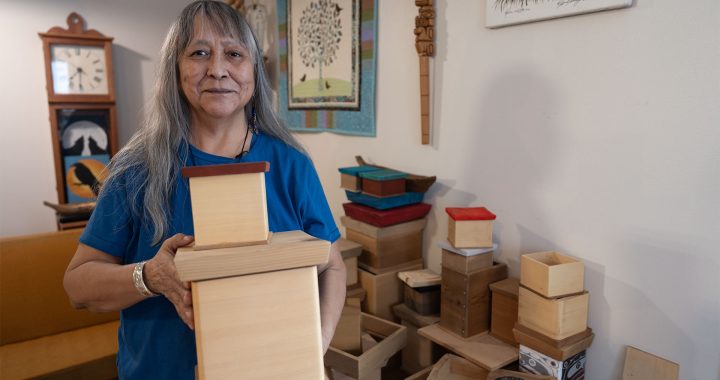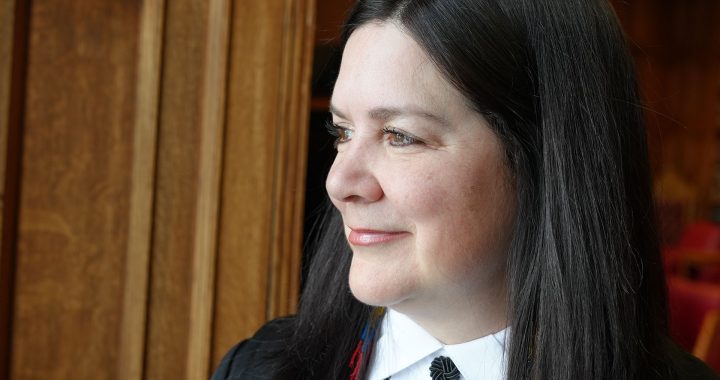A Canadian senator hopes the country is one step closer to limiting the use of Structured Intervention Units by the Correctional Service of Canada (CSC) after her bill passed through the chamber on Tuesday night.
Kim Pate’s Bill S-230, introduced in the senate in 2021, is also known as Tona’s Law named after an Indigenous woman Tona Mills.
“The horrific reality is this is an Indigenous woman who went through 10 years of isolation and then had to be in the mental health system for another 11 years and has been free and clear of the system for just less than one year and diagnosed with terminal cancer,” Pate said at a news conference in Ottawa on Wednesday morning.
“She (Mills) said she hopes before she dies that she would see a law that would prohibit what happened to her.”
According to Pate, Mills was “jailed for breaking into a school after escaping her home situation where she was being raped by her birth father. She was part of the ‘60s Scoop, and when she went to find her family, her birth father said she could live with them and then proceeded to rape her.”
Pate added that the risk assessment conducted by the CSC “described her as having a sexual relationship with her father.”
“Nowhere else do I know where incestuous rape would be called a sexual relationship with your father,” Pate said.
Pate said Mills is a ‘60s Scoop survivor who lives in Nova Scotia.
Her federal sentence started in 1994 and she got out briefly in 2003 and again in 2005. A mental health breakdown led her to calling police on herself. In 2008 she was declared NCR, or not criminally responsible and spent her time in a psychiatric unit for more than a decade. She was then integrated into mental health supported living before being discharged in 2023.
As a result of spending a decade in segregation, she developed isolation-induced schizophrenia.
From segregation to structure intervention units

Ottawa committed to ending segregation in 2019 after a number of court cases ruled the practice unconstitutional recognizing the physical, psychological and neurological harms that can result.
The Correctional Service of Canada, or CSC, implemented what it calls, Structured Intervention Units to “help offenders adopt more positive behaviours through targeted interventions and programs.” But many argue the CSC has simply put a new name on the segregation units.
According to CSC, SIUs offer inmates four hours of out of cell time, round the clock access to their personal belongings, access to health professionals and two hours of “meaningful human contact.”
Anne Kelly, commissioner of the CSC appeared at a senate committee examining Pate’s bill on Dec. 13, 2023. She said at that time, 1.6 per cent of the approximately 35,000 people locked up in Canada’s penitentiaries are in an SIU. Kelly said they’re in an SIU for the “security of the institution.”
“There are some inmates who cannot be safely housed in the mainstream inmate population because of the risk they pose to themselves or to others,” said Kelly. “SIUs are not about punishment or causing harm. Quite the contrary, they are about helping inmates and providing them with the opportunity for targeted interventions, programs and health services to support their safe return to a mainstream inmate population as soon as possible.”
According to Pate, a prisoner’s stay in an SIU “lasts longer on average than under the previous regime, with more than half of people held for more than 15 days and some says (stays?) as long as 552 days.”
Pate said that CSC is also not following guidelines and referring the cases of inmates to “independent external decision makers” who are supposed to review cases of people being put in an SIU. She said that these reviews are only guaranteed after 90 days and prisoners can’t request one for themselves.
According to a number of groups that gave evidence at the committee, CSC can’t be taken at its word when it says it complies with policies.
“Judicial oversight is really essential,” said Jen Metcalfe, vice president, Canadian Prison Law Association. “Lack of compliance has been an ongoing problem for Correctional Service Canada, and we really need to have the courts weighing in on and enforcing the rules. In prisons, rules are everywhere, but the rule of law is absent.”
The B.C. Civil Liberties Association agreed. Vibert Jack, litigation director at the BCCLA, added that the policies outlined in Bill C-230 doesn’t go far enough to ensure people with mental health issues don’t face segregation in prison.
“I have more than concerns,” said Jack at the committee. “I have no doubt that the prisons will not comply with these laws because they have a history of not complying with laws.”
Changes to the system
According to S-230, there would be changes for the current SIU structure. If passed, the CSC would require it to transfer any inmate who has “disabling mental health issues” to a hospital.
Kelly was asked by Sen. Pierre-Hugues Boisvenu how many current inmates would fall into that category. She said she’d provide that information at a later date. APTN New followed up with CSC media relations for the information but no one responded to our request.
The law would also force CSC to seek a court order for anyone being confined for longer than 48 hours and “allow for persons who are sentenced to a period of incarceration or parole ineligibility to apply to the court that imposed that sentence for a reduction if there has been unfairness in the administration of their sentence.”
Pate said her proposed legislation would build upon existing regulations contained in 1992s Corrections and Conditional Release Act.
“At that time this was a piece of human rights legislation aimed in particular at helping ensure people who shouldn’t be in prison weren’t there,” she said “Section 29 says people with mental health issues and health issues should be in health settings. This bill, Bill S-230, helps push that along.”
Pate said the bill also draws on recommendations in the 2021 Senate Report on the Human Rights of Federally-Sentenced Persons.
Statistics included with the background to the legislation said minority groups such as Indigenous people are far more likely to suffer the negative consequences of segregation in the prison system.
For example, Indigenous people make up 44 per cent of those in segregation and Indigenous women 96 per cent of females in segregation.
Edmonton NDP MP Blake Desjarlais is the bill’s co-sponsor and said he is hoping for cross-party support so the legislation can get through Parliament as quickly as possible.
“Solitary confinement doesn’t work,” he said “It harms people. It creates a longer life of pain. We need to see a kind of future when our justice system is restoring people. Is helping them to reintegrate into community.”
The proposed law must now go through the House of Commons. There is no date to have it introduced there.
According to the Parliamentary Budget Officer, an agency that keeps track of the costs of government programs, Bill C-230 will cost an extra $6.8 million annually because of the “costs associated with participation in new legal processes.”
With files from Mark Blackburn










